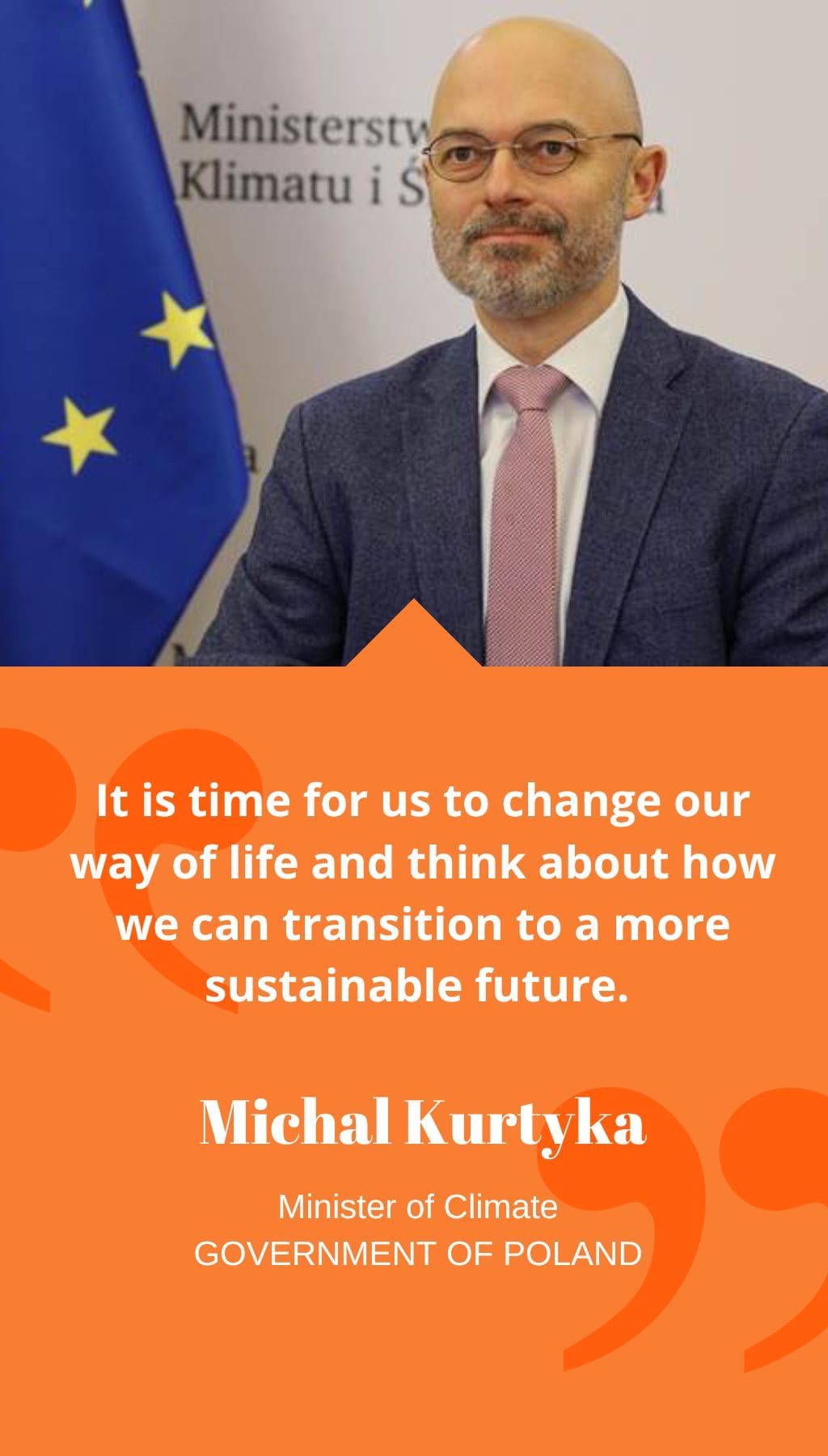
- Poland | 26 July 2020

Could you please explain your vision and plan as the head of the newly established Ministry of Climate?
As the head of the Ministry of Climate, I believe that we are currently undergoing a major shift in our attitude towards natural resources. It is time for us to change our way of life and think about how we can transition to a more sustainable future. One of our main objectives is to improve the quality of life of Poles, particularly by addressing the issue of air pollution. We also need to ensure the energy security of our country, which will involve transitioning to zero-emission energy sources and technologies such as nuclear power. Our goal is to do this in a just manner, with a focus on lowering the cost and burden for society. The Ministry of Climate will play a crucial role in this process, especially in pursuing Poland’s interests in achieving climate neutrality in the international arena and the EU.
As the President of COP24, could you discuss the key takeaways from the “Katowice Rulebook”?
The 2018 COP24 Climate Conference had three main themes: humanity, technology, and nature, which were followed by three declarations proposed by the Polish Presidency. The first of these declarations focused on the importance of solidarity and a just transition, recognizing that climate policy cannot be separated from the economy and that people need to be the focal point in the debate on climate neutrality. Another success of COP24 was the introduction of the topic of forests to the international climate debate with the Forest Declaration. Lastly, the Electromobility Declaration was signed by countries representing over half of the world’s population, highlighting technological revolution as one of the elements of the struggle to curb emissions and pollution, including electromobility.
Poland recently opted out of the EU’s net-zero emissions target by 2050. Could you explain the reasoning behind this decision? What must be considered to ensure a just transition for Poland?
While the EU has adopted the climate neutrality target, Poland, along with other EU Member States, has been granted an exception from achieving climate neutrality by 2050, taking into account our specific situation. However, Poland is committed to fulfilling its obligations under the Paris Agreement. The European Commission’s proposal on a just transition recognizes the specific challenges faced by regions in Poland, particularly those dependent on fossil fuel extraction. To ensure a just transition for all citizens, we need to provide these regions with the conditions for further development and growth. It is important to remember that Poland is starting from a different point than other countries, with nearly 80% of all energy produced in Poland coming from coal. Therefore, our transition to green energy sources will be a long-term process that we need to approach prudently.
What steps is the Ministry of Climate taking to address air pollution in Poland?
The Ministry of Climate is implementing the “Clean Air” Program, which is a government program on an unprecedented scale in the EU. This program supports the insulation of single-family houses and the replacement of old and inefficient solid fuel heat sources to improve air quality. We are continuously working to simplify the program and make it more effective. Soon, potential beneficiaries will be able to submit their applications online, which should make it easier to take advantage of the program. Additionally, the processing time will be shortened, and technical details will no longer be required in the application, which should increase the number of applications submitted.
Solar energy is thriving in Poland, but onshore wind energy still faces limitations due to the 10H rule. Do you anticipate any changes to this rule in 2020? If so, how will it be amended?
Ministry of Climate representative: The Ministry of Climate is actively seeking new solutions to advance the development of renewable energy sources (RES) in Poland. As you pointed out, solar energy has been experiencing a significant surge, thanks in part to Europe’s largest funding program for photovoltaic micro-installations, “My Electricity” program. There has been noteworthy progress in this area, which underscores the fact that successful energy sector transformation necessitates support and regulation to unlock investment potential. The projected capacity of the Baltic Sea suggests that offshore wind energy will play a critical role in Poland’s power system, and we are therefore proposing a revised offshore wind energy law that incorporates public consultation feedback.
Given the COVID-19 pandemic, which is affecting industries worldwide, what measures is Poland taking to ensure energy security during this difficult time? Have you assessed the short-term impact of the crisis on the energy sector?
The unprecedented situation caused by the COVID-19 pandemic has required us to take extraordinary measures. Undoubtedly, this crisis will impact all aspects of our lives, including the economy. Our primary objective is to ensure security for all citizens, which is why the government has prepared regulations that provide concrete support for entrepreneurs and local governments.














